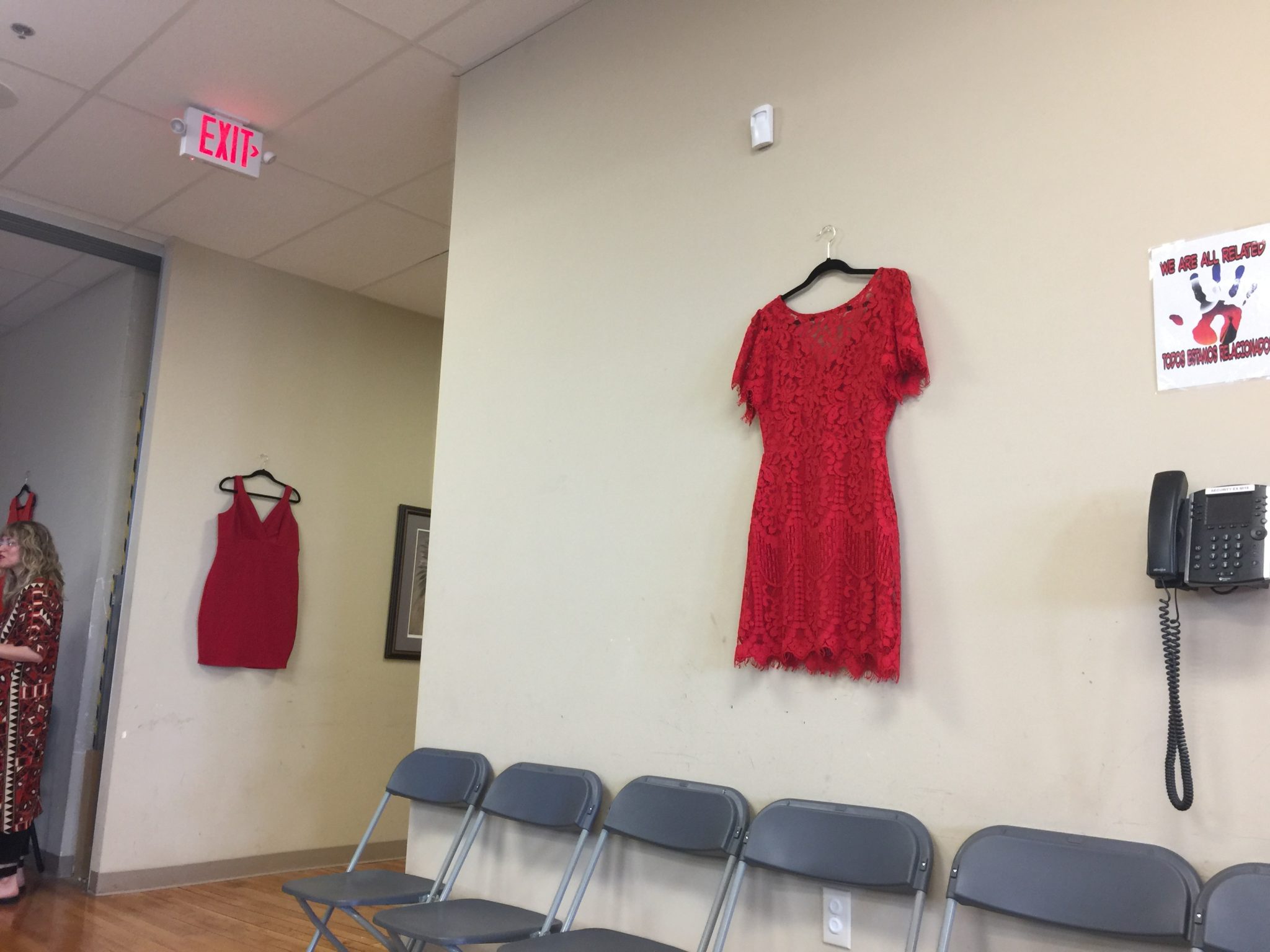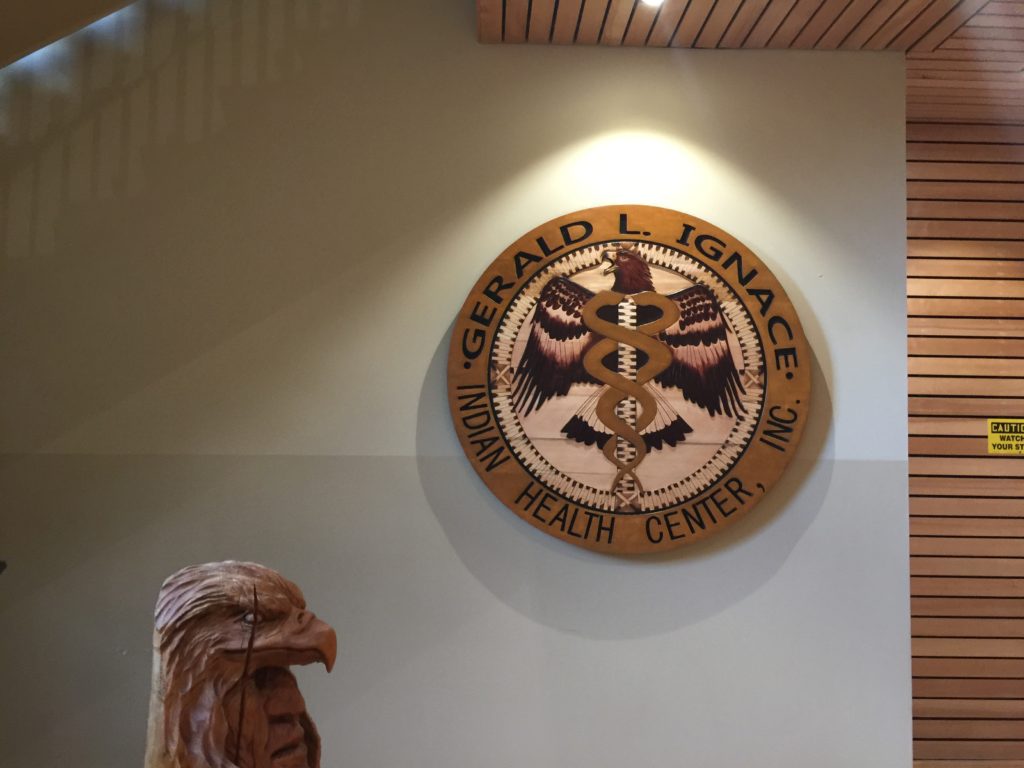It’s a warm Sunday morning and people gather at the Gerald L. Ignace Indian Health Center located on the south side of Milwaukee. The event is called “Honoring Our Sisters: Red dress brunch”
The room is filled with red clothing items and mostly women attendees. People throughout the Native American community of Milwaukee unite to learn more about the violence against Native American women and girls.
May 5this the national day of awareness for Missing and Murdered Indigenous Women(MMIW)
Their flyer requested everyone to wear red to honor to remember, honor and bring awareness for Indigenous women and girls.

The Redress is the national symbol for the MMIW movement. The project was created by visual artist Jamie Black
The free event was provided by the Circles of strength program with the Indian Health Center.
The Circles of Strength program is domestic violence and sexual assault program support circle at the Center. The program offers medical and behavior health and social services for women at risk of violence, or currently in violent situations.
Some of the women in red are elders to the youth. Almost everyone wore items of red, from bright red shoes to sparking red earrings. The room showered with solidarity.
The event started with a prayer. They offered the practice of smudging with sage to everyone in the room.
Deborah Black the Deputy director and licensed psychologist in the behavior health department at the Indian Health Center oversees the Circles of strength program.
They planned this event to bring education and awareness to community of Milwaukee related to issues of sexual violence against Native women and the connecting to national issues of Human Trafficking epidemic.
“The data. That it’s so hard to identify due to the variety of reasons why we don’t know why these women are missing, but I do know and believe that yes a lot of them are being sex traffic and they go missing from their family and never to be seen again,” said Black.
The key note speaker was Dr. Alexandra Piece. She received her Masters and doctoral degree in sociology from the University of Minnesota.
She is also the President of Othayonih Research with 20 years of experience with research on domestic violence, sexual assault and sex trafficking.
A savior of sex and labor trafficking the author of Shattered Hearts.
She was the first researcher to be published in the United States on commercial sexual exploitation of Native American women and girls.
Her presentation connected the past to the present using the image of the Native American Women and examining how the creation of the “sexual savage” stereotype.
The stereotype encourages trafficker’s violence against Native women and incites traffickers to target women/girl’s profitable exotics.
A report done with the Urban Indian Health Institute on 5,712 cases of were of murdered and Missing Indigenous Women in the United States as of 2018 only 116 cases were in NamUs were Indigenous women.
She connected Human trafficking victimizes as women part of an economic system. A system fuel by control to generate a profit for traffickers and that traffickers view as a business.
“It’s all about money. It’s a criminal operation with profit as the goal.” said Pierce
The program also connected Human Trafficking to the MMIW and within the city of Milwaukee.
Mariana Rodriguez, program Manager at the Latina Resource Center at United Migrant Opportunity Service also known as UMOS.
She addressed issues about Human Trafficking within Wisconsin from an intersectional framework.
“It’s very easy to label a person a drug addict or in prostitute or to blame the victim.” Rodriguez said.
She informed the large issues within a sex trafficking are higher demand for foreign women.
As well as the issues of law enforcement not being distinguished the difference between sex work and sex trafficking.
A report done with the Medical College of Wisconsin examined human trafficking from 2013 to 2016 confirmed that 81 per cent or 187 individuals who had been trafficked confirmed to have reported prior history to sexual assault victimization and a history of being reported missing under Milwaukee Police Department.
97 per cent or 225 individuals being identified as female and 65 per cent or 149 individuals were Black/African American.
“The barriers we encounter in term of being racial misclassified, or the barriers of juridical issues to the barriers of intuitional racism, just the issues of native women not being as of much importance as it will be in other mainstream community. Due to Deep systematic barriers and vulnerabilities native people experience over time,” said Black
An Attendee at the program came to learn more was Celeste Clark a member of the Lambee tribe and senior advisor in American Indian Student Services at the University of Wisconsin-Milwaukee.
“It was kind of overwhelming and distributing and emotional to find out were the highest number being murder and missing, rape and domestic violence,” said Clark.

She known about the Missing and Murdered Indigenous Woman since 2015.
Clark felt that event was informative and that everyone should be aware on MMIW and human trafficking issues.
The number of statics against Native people still conflicts Clark.
“That’s what bothers me why is it our population with the highest number? Are we too trusting? I don’t get it because we have the highest of everything. Highest dropout rate highest disabilities then you see this. I don’t understand how can another human being do this to another human being,” she said.
The Indian Health Center provides medical, behavior and social services to the Native and Greater community of Milwaukee for the pass 30 years. Most recently they added Dental and Pharmacy services for the community.
They offered a holistic approach to mental, substance abuse, medication, cultural, youth services and the circle of strength domestic violence program.
The Indian Health Center care is culturally inclusive to Native people cultural practices when providing survives.
In the future, Deborah Black hopes to see justice for Native women and for those who are survivors she hopes for healing. “You can heal from it, you can heal from violence…its possible to feel safe again.” she said.
If you wish to use or get involved with the services of Indian Health Center you can contact Deborah Black (414) 316-5092 or their main line at (414) 383-9526.